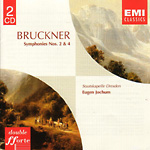Eugen Jochum conducts Bruckner’s Symphony No. 2 with an ear for its classical underpinnings. The music flows freely, with seamlessly dovetailed transitions between sections. The first movement’s rhythmic second subject builds tremendous energy at Jochum’s quick pace, but then he really pours on the speed for the coda. These same qualities grace the remainder of the performance–the adagio shimmers serenely under Jochum’s elegant sensitivity, while his sense of Beethovenian drama propels the finale to a bracing close. The Staatskapelle Dresden provides spectacular playing, and the only drawback is Jochum’s use of the Nowak edition of the score, which imposes extensive cuts throughout (including an especially disfiguring one in the finale).
Jochum’s Bruckner Fourth proceeds with a great flowing grandeur, making the music at once propulsive and magisterial. The reading is ideally balanced with brilliant realizations of important motivic points (as in the first-movement development). Strangely for a conductor so committed to Bruckner’s original source material, Jochum includes the very un-authentic cymbal crash in the finale. But this does not detract from the reading’s overall excellence. That said, Jochum’s magnificent earlier recording, with its stunning playing by the Berlin Philharmonic, is finer still. But anyone coming to Jochum’s Bruckner for the first time is certain to find this an all-engrossing Fourth. EMI’s recording relays the sumptuous acoustics of Dresden’s Lukaskirke, though the later (1980) Second has more clarity and impact.
































